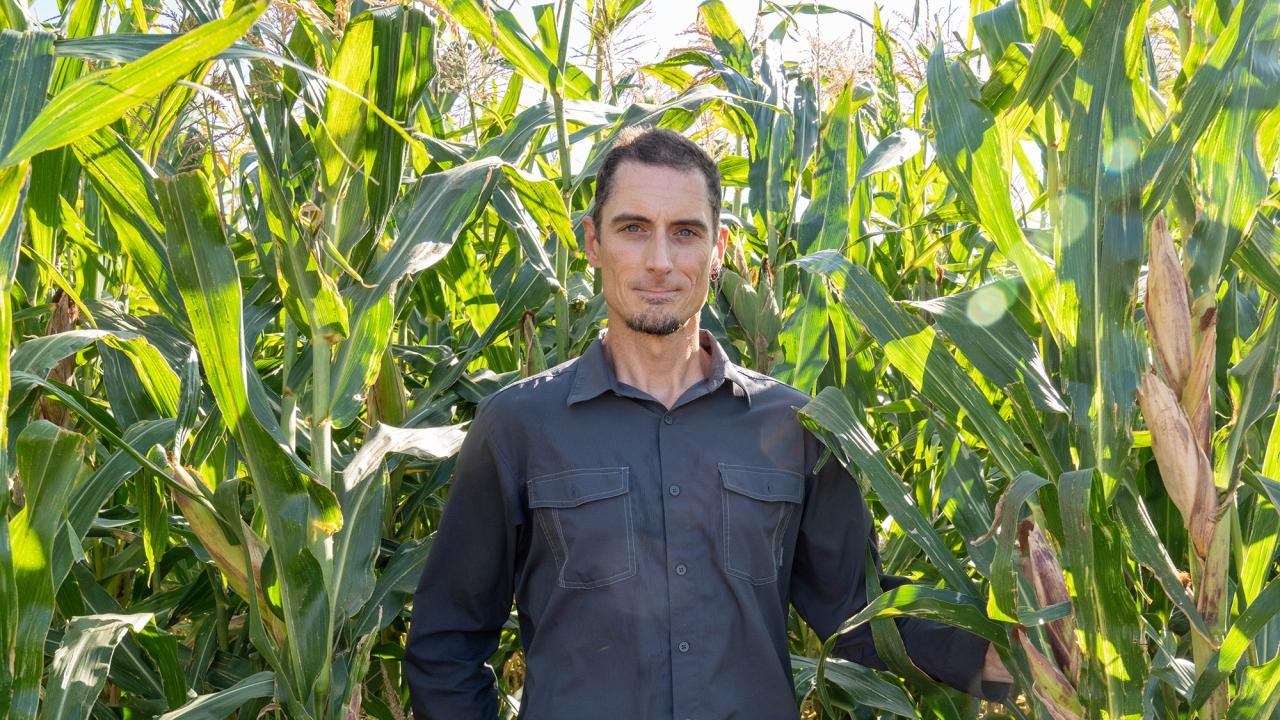Jeffrey Ross-Ibarra, a professor in the Department of Evolution and Ecology at the University of California, Davis, has been awarded the prestigious National Academy of Sciences Prize in Food and Agriculture Sciences for 2024. Ross-Ibarra was awarded the prize in recognition of his “pioneering studies on the evolutionary genetics of maize, a key crop species for global food production.”
The prize, which was established in 2017 in partnership with the Bill & Melinda Gates Foundation, is awarded annually to a single recipient who receives a medal and a $100,000 cash award.
Ross-Ibarra says he was honored and surprised to receive the award, which he sees as a welcome acknowledgment of the value of basic research.
“Sometimes in the push for things to be applied we ignore the fact that there’s a lot of value in basic scientific research,” Ross-Ibarra said. “I’d like to think that this prize is a recognition of the fact that basic science approaches like the evolutionary genetic work we’re doing do have long-term value and relevance to practical applications.”
Ross-Ibarra acknowledged that his research achievements are the result of a huge amount of collaboration.
“Although I’m the person listed on the award, there’s certainly no way that this is a one-person show,” he said. “I’ve been extremely fortunate to have worked with a large number of really talented people without whom this would not have happened.”
The academy will present Ross-Ibarra with the prize at an award ceremony in Washington, D.C., on April 28.
This is the second consecutive year that the NAS Prize in Food and Agriculture Sciences has gone to a UC Davis researcher — in 2023 the prize was awarded to Huaijun Zhou, a professor in the Department of Animal Science.
Maize as a model for climate adaptation
Ross-Ibarra’s research centers on the evolutionary adaptation of maize and its wild relatives. Using genomic methods, his lab is untangling the hows and whys of maize’s extraordinary adaptiveness.
“Maize has already adapted to a huge range of environments — it’s grown everywhere from southern Finland to the tropics, and from sea level to 4,000 meters above sea level,” Ross-Ibarra said.
His work has myriad applications including predicting crop performance, understanding how maize and other plants might adapt to climate change, and shedding light on the interrelationships between humans and plants.
“My hope is that some of our findings are useful for breeding maize and other crops for future climates,” Ross-Ibarra said.
Letting evolution do the hard work
When searching for genes and adaptive traits that might help plants thrive under different environmental conditions, Ross-Ibarra’s strategy is to look at how evolution has already solved similar problems in other parts of the world.
“Rather than trying to reinvent the wheel, our evolutionary perspective takes advantage of the fact that nature and time and evolution have actually done the work for us,” he said. “For example, if we want to grow maize in Iowa in 2050, there are probably parts of the world right now which look fairly similar to Iowa’s future in terms of environment or climate.”
By analyzing how maize has adapted to those environments, Ross-Ibarra’s team hopes to identify genes and alleles that could be harnessed to breed maize that will thrive in any number of future environments.
Humans and maize have co-evolved
Maize can’t exist without people, and in many places, people can’t exist without maize.
“If you leave a cornfield alone, in a couple of years, there’ll be nothing there, and in the same vein, you don’t get large civilizations or populations in many places in the Americas without having a staple crop like maize,” Ross-Ibarra said.
He is exploring this co-dependence alongside archaeologists and human geneticists in a new NSF-funded study.
“We’re really excited to think about maize and humans as a combined, co-evolved system,” Ross Ibarra said.
Media Resources
Media Contacts:
- Jeffrey Ross-Ibarra, Evolution and Ecology, rossibarra@ucdavis.edu
- Andy Fell, News and Media Relations, 530-304-8888, ahfell@ucdavis.edu
Liana Wait is a freelance science writer based in Philadelphia. She has a Ph.D. in ecology and evolutionary biology and specializes in writing about the life sciences.
